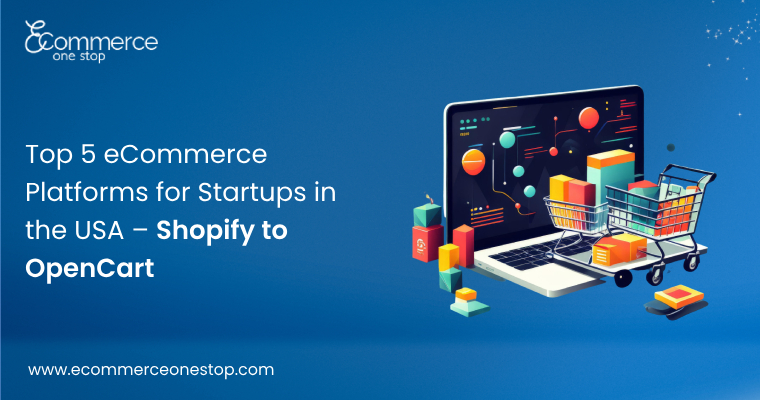In 2025, 21% of retail purchases are expected to take place online, a clear signal that eCommerce is a cornerstone of modern business (
Sellers Commerce, 2025). For startups, launching an online store is a gateway to reaching millions of customers, with 288.45 million online shoppers in the USA alone (
Sellers Commerce, 2025). Choosing the right eCommerce platform is a pivotal decision that can shape your startup’s growth, customer experience, and profitability.
This blog dives into the top five
eCommerce platforms for startups in the USA that are Shopify, BigCommerce, WooCommerce, Wix, and OpenCart, highlighting their features, pricing, and how their development services can help you succeed.
Get Your Project Started
Book a free consultation with our Ecommerce experts.
Connect Now

Why Choosing the Right eCommerce Platform Matters for Startups?
The eCommerce market in the USA is estimated at USD 1.31 trillion in 2025, and is expected to reach USD 2.15 trillion by 2030, growing at a 10.35% CAGR through 2030 (
Mordor Intelligence). For startups, this growth presents both opportunity and competition. A well-chosen platform can streamline operations, enhance customer experience, and scale with your business.
Key considerations include ease of use, cost, scalability, and support for modern trends like mobile commerce and digital payments. With most of North American eCommerce sales processed through digital wallets, platforms must support diverse payment methods.
Key considerations include ease of use, cost, scalability, and support for modern trends like mobile commerce and digital payments. With most of North American eCommerce sales processed through digital wallets, platforms must support diverse payment methods.
Overview of the Top 5 eCommerce Platforms
Here’s a quick look at the five platforms we’ll explore:
- Shopify: Known for its user-friendly interface and extensive app ecosystem, ideal for startups seeking simplicity and scalability.
- BigCommerce: Offers robust built-in features and scalability, perfect for businesses planning rapid growth.
- WooCommerce: A free, open-source plugin for WordPress, offering flexibility for those comfortable with technical setup.
- Wix: A drag-and-drop website builder with eCommerce capabilities, great for beginners with small stores.
- OpenCart: An open-source platform with extensive customization options, suited for startups with technical expertise.
Each platform offers unique strengths, and their development services like Shopify development services, BigCommerce website development services, and OpenCart development services can tailor solutions to your needs.
Detailed Analysis of Each Platform
1. Shopify
Overview
Shopify is a leading eCommerce platform, powering 4.6 million websites globally and holding a 29% market share in the USA eCommerce platform market (
Yaguara, 2025). Its hosted solution eliminates server management, making it a top choice for startups.
Key Features
- User-friendly dashboard for easy store management.
- User-friendly dashboard for easy store management.
- Built-in SEO tools to boost visibility.
- Mobile-responsive themes to capture the mobile eCommerce market.
- 24/7 customer support via chat, email, and phone.
Pricing
- Basic: $39/month
- Shopify: $105/month
- Advanced: $399/month
- Plus: Custom pricing for enterprises
Pros for Startups
- Quick setup, ideal for non-technical founders.
- Scalable to support business growth.
- Extensive app store for customization.
- Strong community and support resources.
Cons for Startups
- Transaction fees apply if not using Shopify Payments.
- Additional app costs can increase expenses
Development Services
Shopify development services can create custom themes, integrate apps, and optimize performance, ensuring your store aligns with your brand and busi
ness goals.
2. BigCommerce
Overview
BigCommerce is designed for scalability, offering robust features for startups aiming to grow quickly. It supports multiple storefronts and has no transaction fees, making it cost-effective for expanding businesses.
Key Features
- Multi-channel selling across marketplaces and social media.
- Advanced SEO tools for better search rankings.
- Headless commerce for flexible front-end design.
- 24/7 USA-based support.
- Native B2B features for wholesale operations.
Pricing
- Standard: $39/month
- Plus: $105/month
- Pro: $399/month
- Enterprise: Custom pricing
Pros for Startups
- Comprehensive built-in features reduce reliance on apps.
- No transaction fees, saving costs as sales grow.
- Scalable for businesses with ambitious growth plans.
Cons for Startups
- Steeper learning curve compared to Shopify.
- Steeper learning curve compared to Shopify.
Development Services
BigCommerce website development services can build tailored storefronts, integrate APIs, and enhance functionality, helping startups create a professional online presence.
3. WooCommerce
Overview
WooCommerce, a free WordPress plugin, powers 20.1% of eCommerce sites, making it a popular choice for startups with WordPress experience (
Mobiloud, 2025). Its open-source nature offers unmatched flexibility.
Key Features
- Smooth WordPress integration for content-driven stores.
- Thousands of plugins and themes for customization.
- Full control over store design and functionality.
- Supports digital wallets and diverse payment methods.
- Large community for support and resources.
Pricing
- Free plugin, but requires hosting ($5-$50/month) and domain costs.
- Paid extensions may increase expenses.
Pros for Startups
- Low initial costs, ideal for budget-conscious startups.
- Highly customizable for unique store designs.
- Benefits from WordPress’s extensive ecosystem.
Cons for Startups
- Requires technical knowledge for setup and maintenance.
- Security and updates are the user’s responsibility.
- Costs can rise with premium plugins.
Development Services
WooCommerce development services can assist with store setup, theme customization, and plugin integration, ensuring a robust and user-friendly store.
4. Wix
Overview
Wix is a website builder with eCommerce capabilities, known for its drag-and-drop interface. It’s ideal for startups needing a quick, professional-looking store without technical expertise.
Key Features
- Intuitive drag-and-drop builder for easy design.
- Over 300 apps for added functionality.
- Mobile-optimized templates.
- Basic omnichannel selling and abandoned cart recovery.
- Affordable pricing for small stores.
Pricing
- Business Basic: $34/month
- Business Unlimited: $38/month
- Business VIP: $64/month
Pros for Startups
- Extremely user-friendly, no coding required.
- Affordable for small-scale operations.
- Quick setup for launching stores fast.
Cons for Startups
- Limited scalability for large or complex stores.
- Transaction fees on lower plans.
- Less flexibility compared to open-source platforms.
Development Services
Wix development services can enhance store design, integrate advanced features, and optimize user experience, making it a viable option for startups.
5. OpenCart
Overview
OpenCart is a free, open-source platform with 190,930 active stores in 2025 (
Storeleads, 2025). It’s suited for startups with technical skills seeking a cost-effective solution.
Key Features
- Multi-store management for multiple storefronts.
- Over 13,000 extensions and themes.
- Built-in SEO for better visibility.
- Supports multiple languages and currencies.
- Free community support.
Pricing
- Free, but requires hosting ($5-$50/month) and domain costs.
- Cloud hosting options: $59-$199/month.
Pros for Startups
- No upfront software costs.
- Highly customizable for tailored solutions.
- Ideal for businesses with technical expertise.
Cons for Startups
- Requires technical knowledge for setup and maintenance.
- Limited official support compared to hosted platforms.
- May need paid extensions for advanced features.
Development Services
OpenCart development services can handle installation, customization, and extension development, creating a fully functional store tailored to your needs.
Comparison of the Top 5 Platforms
| Platform |
Ease of Use |
Scalability |
Starting Price |
Key Features |
Best For |
| Shopify |
High |
High |
$39/month |
App ecosystem, SEO, support |
Non-technical startups |
| BigCommerce |
Moderate |
High |
$39/month |
Built-in features, no fees |
Growth-focused startups |
| WooCommerce |
Moderate |
High |
Free (hosting) |
WordPress integration, flexible |
Technical startups |
| Wix |
High |
Moderate |
$34/month |
Drag-and-drop, affordable |
Small, beginner-friendly stores |
| OpenCart |
Moderate |
High |
Free (hosting) |
Open-source, multi-store |
Technical, budget-conscious startups |
This table highlights the strengths of each platform, helping startups choose based on their priorities, whether it’s ease of use, scalability, or cost.
eCommerce Trends and Statistics for 2025
The eCommerce landscape is evolving rapidly, and startups must align with these trends:
- Mobile Commerce: Mobile eCommerce is projected to reach $728.28 billion in the USA by 2025, accounting for 44.2% of retail eCommerce sales. Platforms like Shopify and Wix offer mobile-responsive themes, while BigCommerce and WooCommerce support mobile apps.
- Digital Payments: Digital wallets account for the majority of North American eCommerce sales, with credit cards. All five platforms support popular payment gateways, ensuring flexibility for customers.
- Market Growth: The USA eCommerce market is expected to reach $1.31 trillion in 2025, with a 10.35% CAGR through 2030 (Mordor Intelligence). Scalable platforms like BigCommerce and Shopify are well-positioned to handle this growth.
- Online Shoppers: With 288.45 million online shoppers in the USA, startups need platforms that can handle high traffic and provide a seamless user experience (Sellers Commerce, 2025).
- Personalization: AI-driven personalization is becoming essential. Shopify and BigCommerce offer apps and integrations for personalized recommendations, enhancing customer engagement.
- Sustainability: Consumers increasingly value eco-friendly practices. Platforms like WooCommerce and OpenCart allow custom integrations for sustainable shipping options.
These trends underscore the importance of choosing a platform that supports mobile optimization, diverse payment methods, and scalability to meet growing demand.
Conclusion
Selecting the right eCommerce platform is a critical step for startups aiming to thrive in the competitive USA market.
Shopify offers unmatched ease of use and a vast app ecosystem, making it ideal for beginners. BigCommerce provides robust features and scalability for growth-focused businesses. WooCommerce offers flexibility for WordPress users, while Wix is perfect for small, user-friendly stores. OpenCart, with its open-source nature, suits startups with technical expertise and tight budgets. Each platform can be enhanced with professional development services to create a tailored, high-performing store.
For startups looking to launch or optimize their online store, we offer expert Shopify development services, BigCommerce website development services, and OpenCart development services.
Contact us today to build a customized eCommerce solution that drives growth and success.


